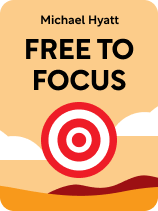

This article is an excerpt from the Shortform book guide to "Free to Focus" by Michael Hyatt. Shortform has the world's best summaries and analyses of books you should be reading.
Like this article? Sign up for a free trial here.
Are you having trouble determining what’s a priority? How do you decide if your commitments meet your needs?
In Free to Focus, Michael Hyatt reminds you that you can only do one thing at a time and can’t accomplish everything. So, whenever you commit to doing something, you’re also opting not to do other things.
Continue reading to learn how to set priorities in life that will benefit you.
Decide Which Commitments to Accept
It may seem obvious that when you commit to one thing, you can’t do anything else for the time being, but staying mindful about these inherent tradeoffs helps you make better decisions and learn how to set priorities in life.
For example, if you agree to meet a friend at the bar one evening, you can’t use that time to be with your family, prepare for work the next day, or get to bed early. Hyatt isn’t saying it would be wrong to spend time with your friend instead of doing those other things; just make sure to consider the opportunities you’d pass up by making such a commitment.
Hyatt adds that the Productivity Matrix is the perfect tool for evaluating requests and opportunities. Before committing to something, consider whether it falls into your Productivity Zone, meaning the area where your skills and interests align with each other.
If this new task is in your Productivity Zone (and you have the time for it) you’ll most likely want to accept that commitment. If not, you should strongly consider turning the other person down.
| Consider Whether Your Commitments Meet Your Needs Free to Focus shares many principles with the book First Things First by management expert Stephen R. Covey. One of the most notable similarities is both books’ emphasis on eliminating tasks and activities that don’t serve a purpose. However, Covey adds to this idea by identifying four essential needs that everyone shares: 1. Survival: To sustain life, people need physical necessities like food, shelter, and medicine. 2. Connection: People need to socialize in order to stay mentally and emotionally healthy. Connection includes both friendships and (for most people) romantic relationships. 3. Learning: People naturally crave knowledge and new experiences. Without such novelty, we tend to become bored or even depressed. 4. Giving back: People want to feel important and useful, like they’ve improved the world in some way. This is also closely related to the desire to be remembered after death. So, when deciding whether to make a commitment, first consider whether it will help you meet one of your fundamental needs—and if making that commitment will force you to pass up another opportunity that would meet your needs more effectively. |
Tip: Make a “Do Not” List
To help keep yourself on track, Hyatt says that creating a list of things not to do is just as important as maintaining a to-do list.
This involves examining your current commitments and activities and identifying which tasks can be permanently eliminated from your life. Then, write those tasks down so that you remember not to do them, or to make commitments relating to them, anymore.
For instance, if you often stay up late playing a particular video game instead of getting a good night’s sleep, that game is a good candidate for your “do not” list.
(Shortform note: Permanently removing something from your life—even something you’ve identified as unproductive—is often difficult because of what psychologists call loss aversion, where people feel loss more strongly than they would feel an equivalent gain. For example, the happiness you feel from a bartender handing you a drink is much less intense than the disappointment you’d feel if you then spilled it. Due to loss aversion, adding something to your “do not” list feels very risky; the benefits of doing so would have to far outweigh the loss of what you gave up in order to seem worth it.)

———End of Preview———
Like what you just read? Read the rest of the world's best book summary and analysis of Michael Hyatt's "Free to Focus" at Shortform.
Here's what you'll find in our full Free to Focus summary:
- How you can achieve more by doing less
- How to use the Productivity Matrix tool to evaluate the value of things you do
- The three areas of your life that you should automate to lessen your mental load






